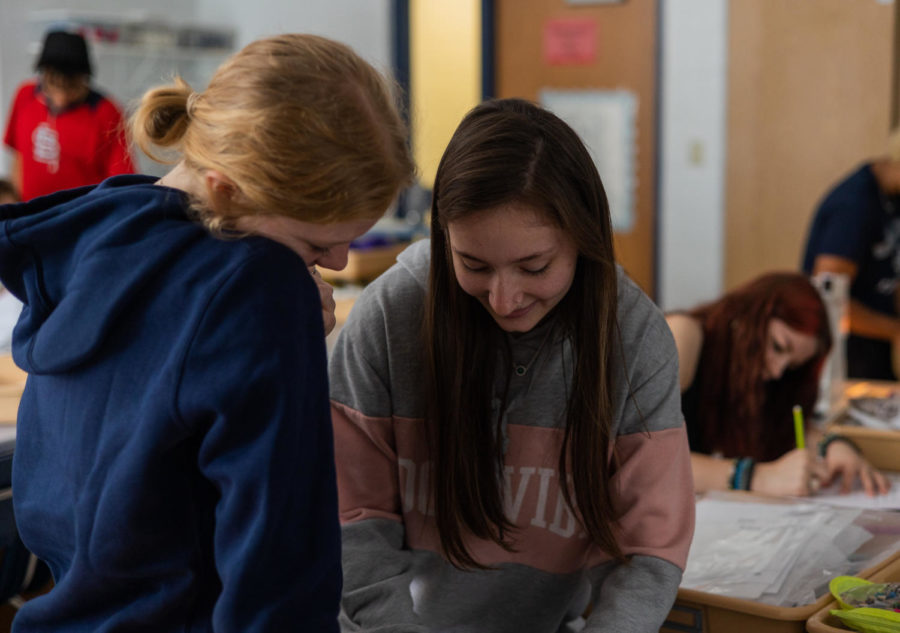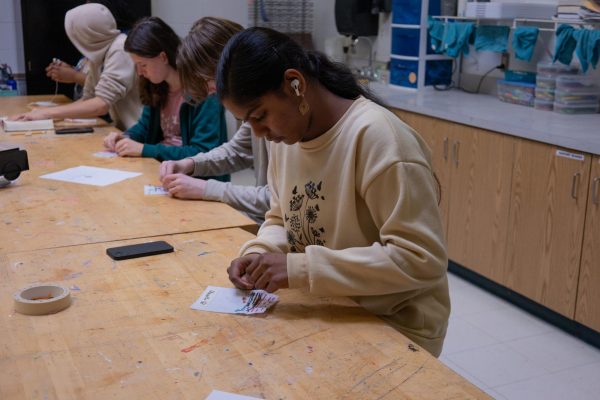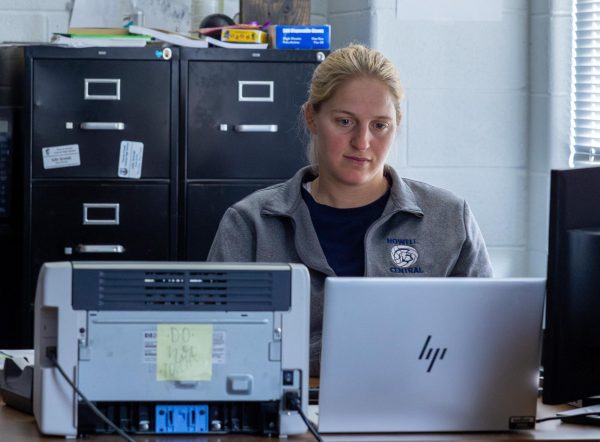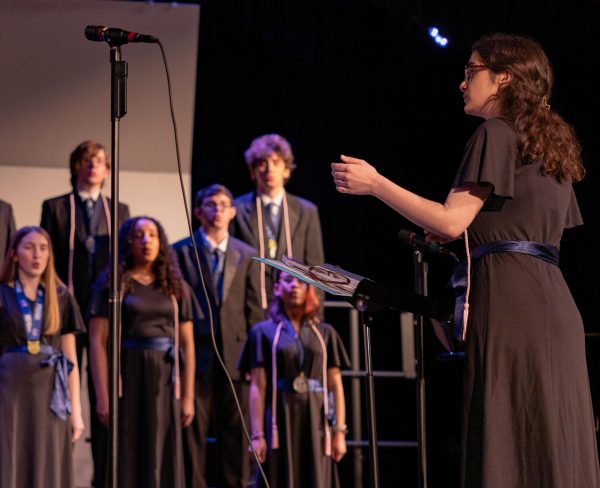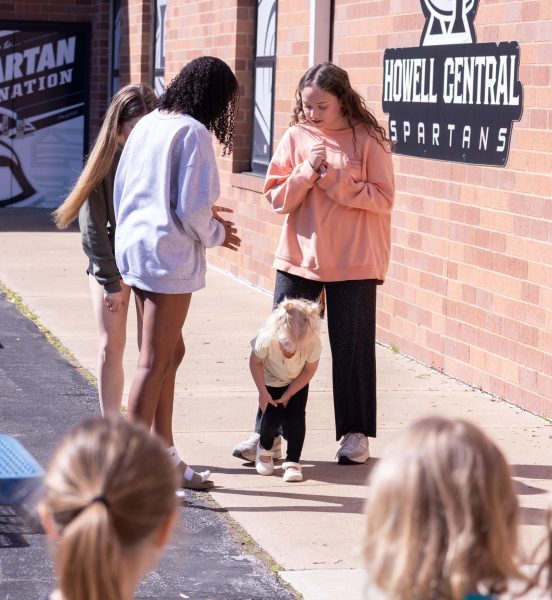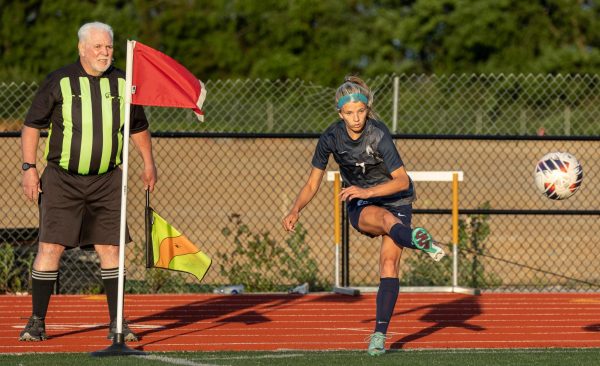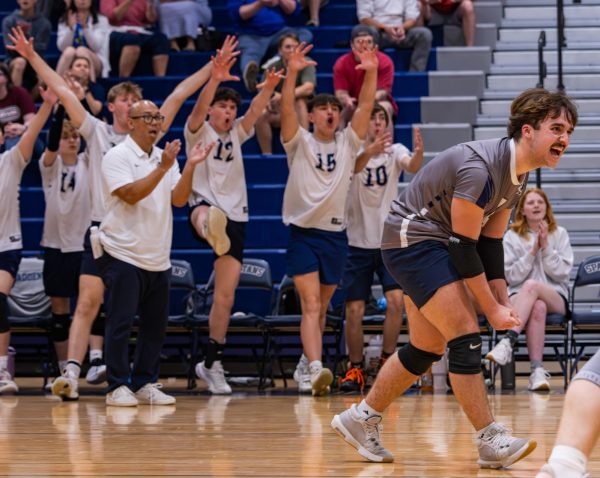Practical and Accessible
Senior Carly Cronin TAs to make sewing course more accessible
Senior Carly Cronin works with a student in Ms. Breen’s Fashion 1 course.
When the time comes for a student to select classes for their schedule they are presented with a wide variety of elective courses from gym classes to cooking classes. However, this experience looks different for individuals who need additional assistance in school; they may be met with limitations in a few courses because they may not be able to perform the required tasks without assistance, as described by assistant principal Dr. Ashley Mair.
“We have to make sure that the environment is safe and that the student isn’t putting themselves at risk or anybody else [by taking particular classes],” Mair said.
This issue came to light when sophomore Zoe enrolled in the Fashion Construction 1 course and was met with concerns over her ability to keep up in the class and enjoy it. Ms. Adrienne Breen teaches both of the fashion courses and was excited to see her sign up, but shared those same worries.
“I was excited that she was going to be taking the class and learning something new,” Ms. Breen said. “[However,] I wanted her to be able to be successful and not get frustrated with certain concepts she may struggle [to understand] … and then not be excited about learning a new skill.”
Dr. Mair knew of Zoe’s circumstances and didn’t want to hold Zoe back from taking the class.
“Zoe is excellent, she is very capable and independent. She wanted to take that course but [some needs had] arisen. But we didn’t necessarily have the staff, nor did Zoe have an extreme situation where we would put a staff member in there so we were looking at unenrolling her,” Dr. Mair said. “[However] that’s never what we want to do: deny a student the opportunity to take something that’s going to enrich their lives.”
In wanting Zoe to be able to take her class to the best of her abilities, Ms. Breen had discussions with the special education department chair, Mr. Kenneth Henson, about possible accommodations.
“I talked to the SPED director, Mr. Henson, and just kind of brought some things up as well with her guidance counselor, seeing what we could do so she could be in this class, and she could enjoy being in this class and kind of see what options were available,” Ms. Breen said.
While Mr. Henson isn’t as well versed in sewing, he was happy to use his expertise to help allow Zoe to thrive in this course.
“We problem solved and worked together as a team [to find a solution]. I don’t know anything about sewing…so I had to rely on the expertise of Ms. Breen,” Mr. Henson said. “There are so many working parts with the school in our department and it’s really hard to get everything to be perfect… but we thought of [the idea of a student coming in as a TA to specifically assist Zoe]… and we just thought that would be a natural support.”
After discussions with Mr. Henson, the conversation went to Mair, who was the one to bring up the option of having senior Carly Cronin TA for Ms. Breen, but mainly be there to help Zoe out when needed.
“[Dr. Mair] said that [Cronin] could be an option since we’re short on paras… and that [she] was an absolute rockstar and [so she] reached out to see if she’s willing to help,” Ms. Breen said. “[Dr. Mair] initially thought of [Cronin] because she is a team leader for seminar circles and [Cronin is] just one of those students that really stood out to Dr. Mair.”
Dr. Mair’s prior experience with Cronin and her flexible schedule littered with study halls made her an easy choice to help Zoe.
“Carly is very compassionate and patient and so I thought it might be something she was interested in and she jumped all over it,” Dr. Mair said. “[Cronin] loves it and [Zoe] is able to take the class and the teacher loves the partnership that was created.”
Cronin’s job within Ms. Breen’s class is to be a helping hand to Zoe, but she’s also there to help any other students who may need assistance.
“I focus on [helping Zoe] first, then I help other students,” Cronin said.
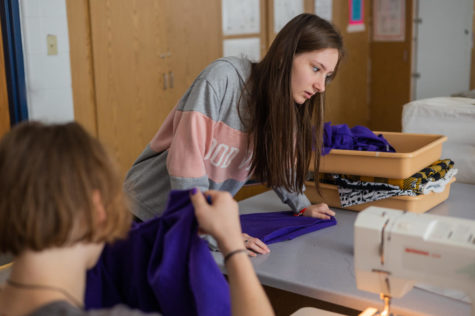
In order to make FACS courses more accessible, it may require the generosity of other students similar to Cronin. Cronin offers her help to Zoe in a variety of ways and the way she has guided her has developed as she learned Zoe’s strengths and weaknesses.
“I’ve realized [Zoe] does a lot better with lists…so I started taking an index card and just making a little checklist for every day,” Cronin said.
There are other tools available to students such as Zoe to aid them in these classes, but accessibility will most likely come from adjusting the way the classes are structured or providing aid from other students, teachers, and paras.
“I think some video tutorials would help [students understand the complicated steps],” Cronin said.
FACS classes are the cornerstone of a stereotypical high school schedule and not only do they serve as enjoyable classes, but they teach valuable life skills. Foods, Fashion Construction, and Child Development are a few of the many classes at Central that teach skills that students can carry with them beyond their four years of high school. These classes can be vital in developing well-rounded young adults who will soon take on life.
“[FACS classes] are all life skills and sewing is one of those… People don’t realize that sewing is a skill that you do need in the real world. [From] sewing buttons to basic stitches,” Breen said.
The skills taught in Breen’s classes are often overlooked, but they offer helpful knowledge that enhances an individual’s skill set, which can be especially useful to students within the special education department. Some aspects of these classes may seem easy at times or even common knowledge, but for students who lack guidance at home or need additional help with tasks, these classes can be life-changing.
Many special education students are offered the opportunity to learn about specific life skills in the “Essential Skills” classes. These, however, are different from a regular FACS class.
“A lot of the students down in the essential skills wing aren’t going to be making some of the things that you make in foods one… [those students] do things that are quick and easy and [also] somewhat healthy,” Mr. Henson said.
No matter how big or small the project, learning skills such as cooking and sewing allows students to have the capability of performing important tasks that will be used throughout life. Having that opportunity to explore these skills available to all students is important to prepare them for life after high school, which is why the school is taking these steps to make every class accessible.
“[Practical arts classes] round us out as humans, right. So you want kids to have the experiences that are going to enrich their lives,” Dr. Mair said. “I think that it’s appropriate and exciting that we’re able to [take steps in the direction of making those classes accessible to everyone].”
Your donation will support the student journalists of Francis Howell Central High School. Your contribution will allow us to purchase equipment and cover our annual website hosting costs. FHCToday.com and our subsequent publications are dedicated to the students by the students. We hope you consider donating to allow us to continue our mission of a connected and well-informed student body.



